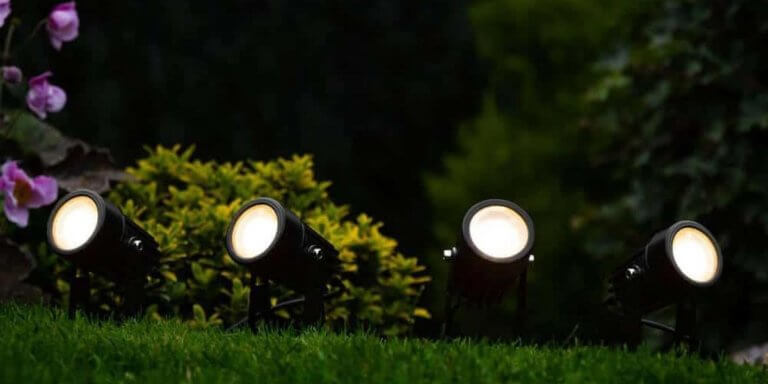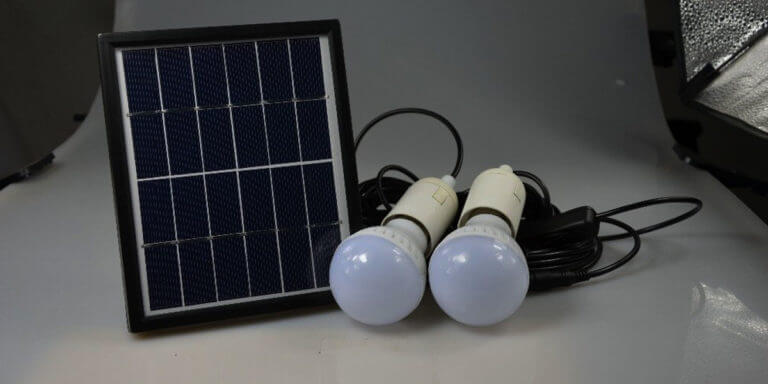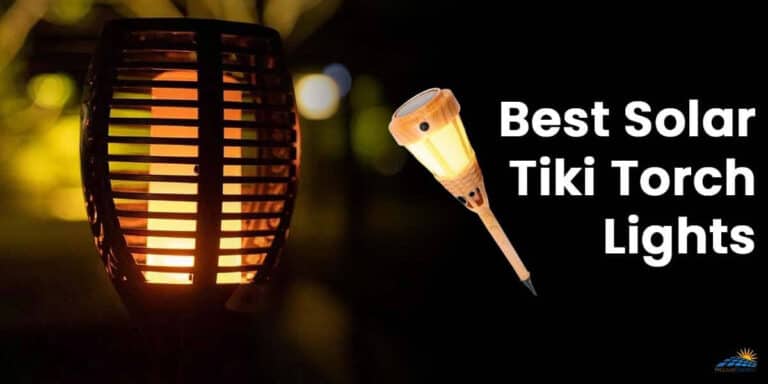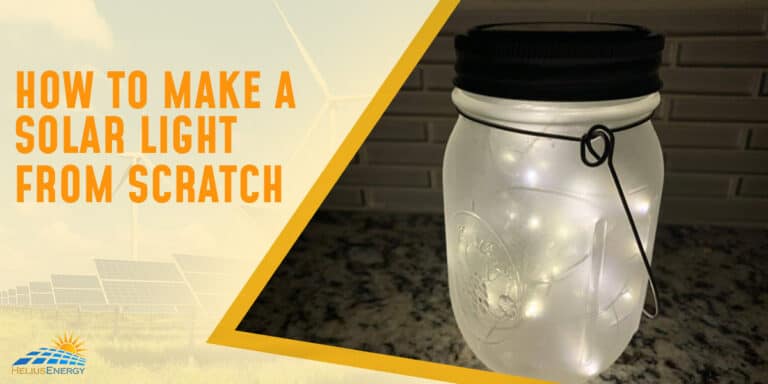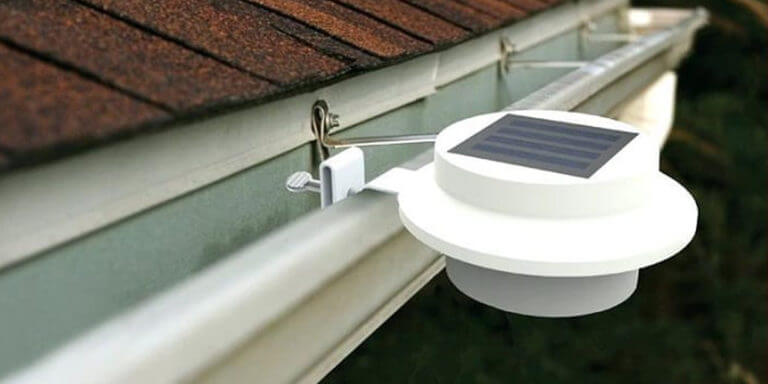Do Solar Lights Need Batteries?
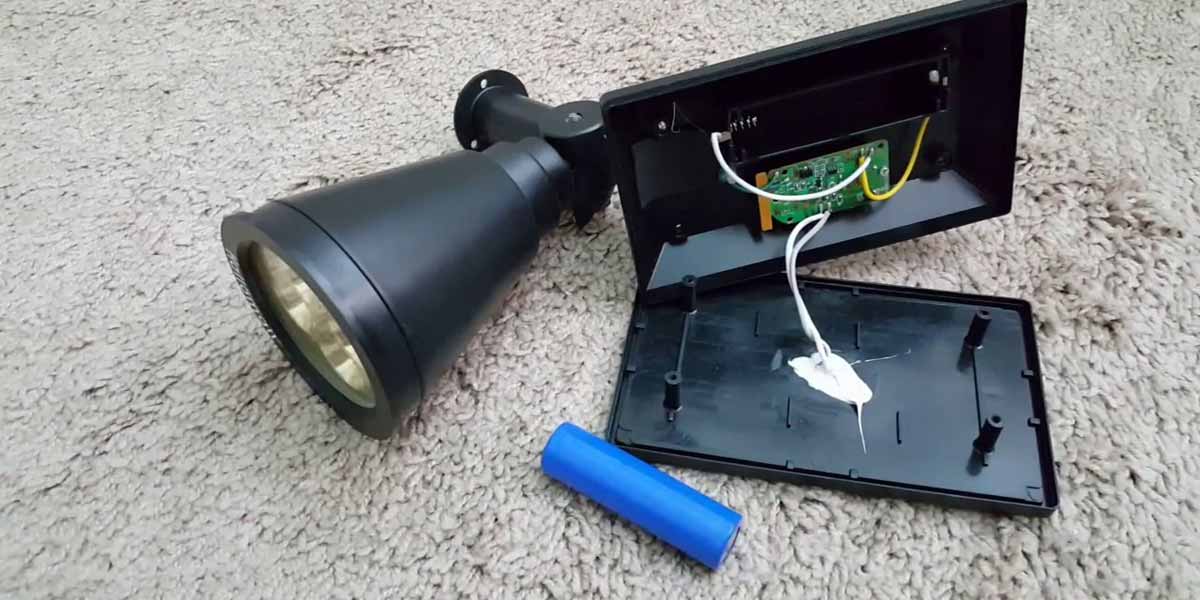
Indoor Solar lights, Gutter solar lights or any other kind of solar lights are one of the most reliable and eco-friendly ways of producing electricity (solar). However, we may usually assume, regular batteries or alkaline-based batteries are not best suited for solar lights.
Their designs are not generally solar unit friendly. Although, as a rule of thumb, you can use a regular battery to charge your solar lights for a concise period, keeping in mind to remove the same after almost a week.
There are two primary types of solar light batteries, NiMH and NiCd, used in solar units to replace damaged cells. Although these are easily available in any local store, the presence of various such interchangeable batteries available in the market often creates confusion among the consumers.
To make everything a little less complicated, let’s glance at a few things in detail to understand the process better.
Rechargeable Batteries VS Alkaline Batteries
As you may know, more or less every electronic device requires a type of energy storage system in the form of batteries. Although solar lights get their power from direct sun exposure, batteries are required to store their energy produced during the day to use at night or even during emergencies. However, like any other usual battery, the solar batteries also start to lose their efficiency, ultimately resulting in the need to be replaced.
As we discussed already, NiMH and NiCd are rechargeable batteries, conveniently sold in most of the stores, and easily replaceable.
Solar lights are more compatible with these rechargeable batteries than the regular ones since the latter cannot store the solar energy produced during the day hours the way both NiMH and NiCd usually do.
Additionally, unlike the regular alkaline batteries, these rechargeable batteries prevent severe damage that the former may cause to the solar lights, such as corrosion and solar panel failure.
Also, NiMH and NiCd batteries are easier to install than regular alkaline batteries. Alkaline batteries also only power your solar lights for a short period.
Do Solar Lights Need Batteries?
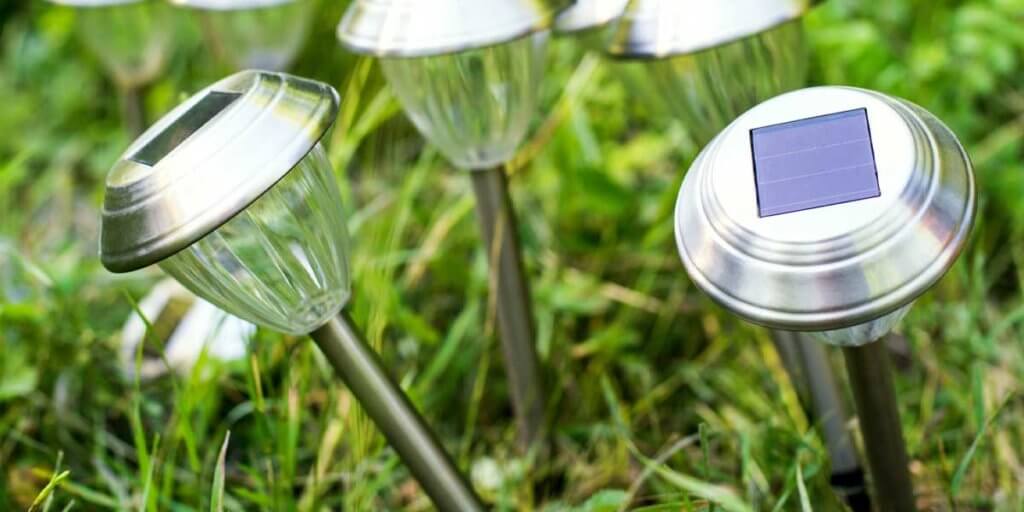
You may wonder, why do solar lights need batteries? To answer that, you need to install rechargeable batteries for your solar lights since the solar panels (may be polycrystalline or monocrystalline solar panels) generally convert the sunlight absorbed during the day into solar power to charge the batteries.
Therefore, this, in return, powers the solar light. In the recent past, most solar lights use about 1.2V NiMH batteries.
Thus, it’s a good idea to replace the batteries of the solar lights regularly, to avoid any damage caused to the lights. If a battery is not present or damaged, it might be the one of the many possible cause behind solar light not working for you.
NiCd Batteries VS NiMH Batteries: The Real Difference
- Memory effect: Unlike the NiMH batteries, NiCd rechargeable batteries suffer from the “memory effect,” which refers to when the batteries are charged before they’re completely flat, the next charge will be lower than the one before. Or in other words, when you continually charge them before they’re fully drained, they reach a point where they no longer hold any charge anymore.
- Capacity: The NiMH batteries have more brownie points than NiCd batteries when it comes to capacity comparison. These batteries can store twice more solar energy than the standard NiCd batteries, offering a better illumination and longer output period overall.
- Environmental Impact: NiMH batteries are more eco-friendly than NiCd batteries as they contain no harmful elements. Thus, they can be disposed of without polluting the environment.
- Price: Although they are different in many ways, they have one point in common: similar price ranges.
Is It Safe To Use Regular Batteries In Solar Lights?
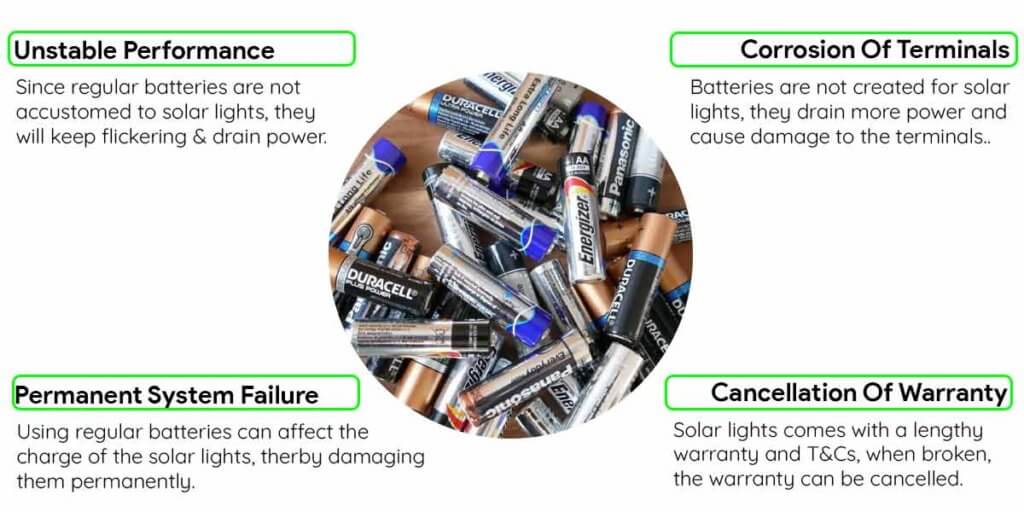
Well, now that we are aware that regular alkaline-based batteries are not an excellent option for solar lights. However, if the need arises to use regular batteries in solar light, you may take a chance at using regular batteries in solar light for a short while. Additionally, since they cannot be recharged, using them can also result in many troubles.
However, each battery is different, so some models can remain functional for up to a week, although it is recommendable to stick to NiMH and NiCd batteries.
1. Unstable Performance
Regular batteries offer functionality for powering the solar lights for a shorter period. Since they are not accustomed or adjusted to work with solar lighting systems, you cannot depend on them to function as efficiently as NiMH and NiCd batteries. Some disruptions, including lights flickering, abrupt power drain, etc., summarize the less than optimum performance.
2. Permanent System Failure
Permanent system damages can be caused due to charging problems and also the inability to store the collected charge. Therefore, using regular batteries in solar lights may put out various risk factors affecting different parts of the unit, depending on the type and quality of battery you install.
3. Corrosion Of Terminals
Regular batteries are designed to be disposed of once they run out of charge and thus, are not suitable for solar lighting systems. Hence, using them to run solar-powered lights may quickly drain the charge and lead to corrosion of the terminals.
4. Cancellation Of Warranty
Solar lights usually come with a lengthy warranty. However, you must consider sticking to the actual terms offered by the manufacturer to incorporate the use of their recommended solar system accessories, such as solar batteries.
However, by using regular batteries, you deprive yourself of the luxury of getting recommendations or coverage for any damages caused to the batteries, which won’t be very satisfactory.
When To Use Regular Batteries In Solar Lights?
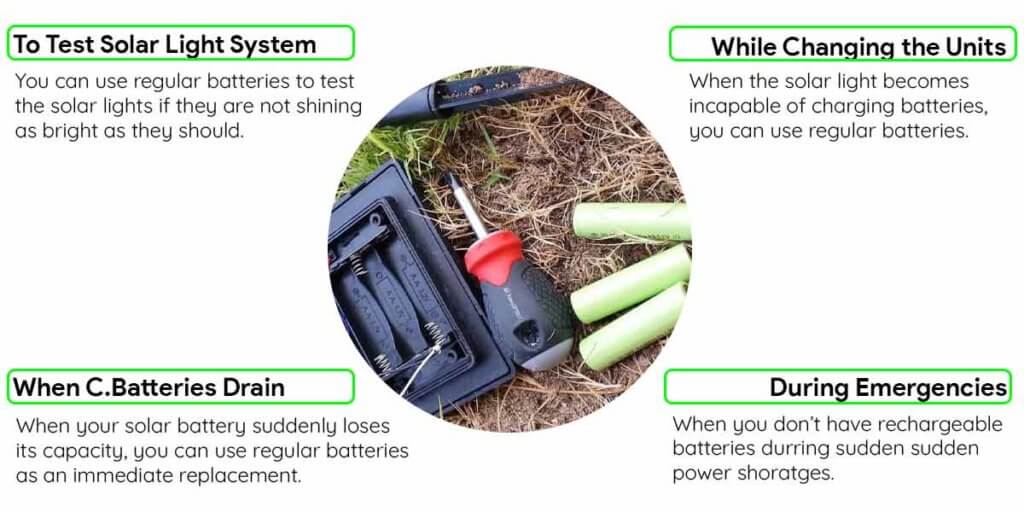
Despite all the red flags, some situations may arise when the use of regular batteries might become the only option for you to run your solar-powered lights. Let’s take a quick peek at all of these possible situations to help prepare and impart knowledge of using a regular battery to run a solar light.
1. While Testing the Solar Lighting System
Well, if you have a pack of new alkaline batteries, you may use them to power your solar lights for a day or two to test out if your lights are working just fine. In case the solar lights aren’t as bright as they should be, you may also use these batteries to check whether your lights or the solar batteries are somehow damaged.
Also, using these batteries for about 2-3 days should help drain the power entirely if you have no plans to use them otherwise.
2. When Rechargeable Batteries Drain Suddenly
Power surges, old age, and various other factors can result in the sudden loss of battery capacity to hold a charge. If your lights stop working all of a sudden and you are unable to find an immediate replacement, you may turn to use a regular battery for the rescue. In such cases, using regular batteries to meet the current lighting needs may be overly justified.
3. While Changing the Units
Sometimes the solar batteries aren’t the cause of your lighting woes. Like every other system, solar units are also subjected to wear out and get older with time, ultimately becoming incapable of charging the batteries sufficiently.
Thus, when the panels stop charging the batteries, regular batteries may help pick up the trail of what is left behind, organizing the necessary repairs and replacements.
4. During Emergencies
Finally, it is important to keep your supply of NiMH or NiCd batteries handy if an emergency arises. However, if the solar batteries are severely damaged while you’re on your hunt for replacements, you can use a regular battery in solar lights for a couple of days.
Conclusion
So, will rechargeable batteries work in solar lights? To conclude on the debate of solar rechargeable batteries vs. rechargeable batteries, using regular batteries on the solar lights are not recommendable since they have different specifications and are designed differently.
Any solar light is generally designed to work with rechargeable NiMH and NiCd batteries, taking into account the capacity and the ability to store solar energy. However, in situations when there are no other ways to revert to for replacing solar light batteries other than turning to use regular batteries, the latter may come in quite handy.

